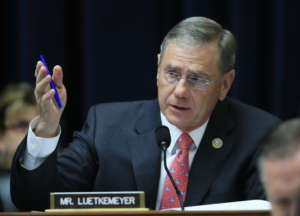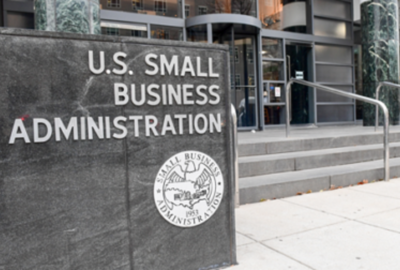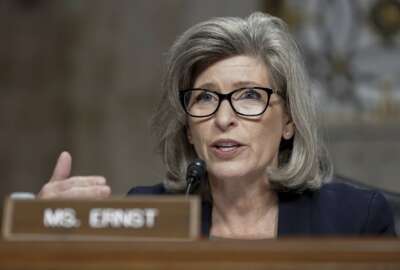GOP lawmakers pan SBA return-to-office plans as ‘extremely minimal’
As SBA seeks more funding for fiscal 2025, House Small Business Committee members push for agency employees to return to the office more often.
This week’s Federal Report is being presented in four sections looking at how certain agencies are facing the pressure for employees to return to the office more often.
Republican lawmakers say teleworking employees at the Small Business Administration aren’t making full use of its office space, and are pressing SBA leadership for an update on efforts to increase in-office work.
House Small Business Committee Vice Chairman Blaine Luetkemeyer (R-Mo.) said in a March 20 oversight hearing that he was “extremely skeptical” of SBA’s request for a 20% budget increase in fiscal 2025, “as there is no evidence the agency is operating effectively or efficiently.”

Among his concerns, Luetkemeyer said SBA has “implemented an extremely minimal return to work policy.”
“This is a direct slap in the face to our entrepreneurs who don’t have the luxury of a day off or the ability to sit in their pajamas and work from home,” Luetkemeyer said.
SBA Administrator Isabella Guzman told lawmakers that employees are in the office at least five days a pay period, “complying with the standards” set governmentwide by White House Chief of Staff Jeff Zients.
“We have 50% occupancy on any given day, at a minimum,” Guzman said. “The whole of SBA, across the country, has returned to work.”
Rep. Mark Alford (R-Mo.) said members of the committee toured SBA’s headquarters on Dec. 3, 2023, and saw “empty office spaces” throughout the building.
“If we’re not going to use these buildings, let’s shut them down. Let’s consolidate and save money for the American taxpayer,” Alford said.
“I’ve long been concerned with SBA’s lax work-from-home policy, and what that means for our nation’s 33 million small businesses, getting them the help they need, when they need it,” Alford said.
Guzman said SBA occupies two-thirds of its headquarters building, and that three other agencies occupy the rest of the space.
“We went to the floors that SBA fully occupies,” Guzman told lawmakers. “We are looking constantly at our space requirements, aligned with our facilities’ needs.”
Acting American Federation of Government Employees (AFGE) Local 228 President Niklas Gustafsson said bargaining unit employees are expected to work in the office a minimum of four days per pay period, “with additional days, depending on the position.”
“Managers have the discretion to have a higher amount, if there’s a particular need,” Gustafsson said. “For example, if you are a receptionist or work in the mail room. If you’re in a position that requires more in-office presence, that would then be required.”
SBA managers and members of the Senior Executive Service, he added, are expected to work in the office at least five days per pay period.
“Employees recognize that there are in-person, in-office functions that need to be accomplished, and SBA bargaining unit employees are professionals and don’t object to that,” Gustafsson said. “However, many employees are confused and do not understand what it is they are accomplishing in the office, when they are in the office, that is different from when they are teleworking.”
Gustafsson said that he and his coworkers are carrying out the same duties each day, whether or not they’re in the office. That means SBA employees sometimes spend their in-office days in videoconference meetings with colleagues located across the country.
“My in-office days look no different than a telework day, from a work process or productivity point of view, and I think that’s true for the vast majority of our bargaining unit,” he said.
Committee Chairman Roger Williams (R-Texas), Luetkemeyer, Alford and five other committee Republicans say SBA office space remains mostly underutilized and is wasting taxpayer dollars.
The lawmakers are asking SBA to clarify its return to office requirements, and are asking why the agency is asking for $42 million for its rent budget in it 2025 budget proposal — a 30% increase from 2023 levels — when it already has “rows and rows of empty desks.”
“Despite the Biden administration’s belated realization that work-from-home policies are counterproductive to servicing the American public, it appears that the SBA has failed to implement an effective strategy to return its employees. Nearly a year after the Biden Administration ended the COVID-19 Public Health Emergency, the SBA is still not back to work,” lawmakers wrote in a March 27 letter to Guzman.
Congressional Republicans have repeatedly pointed to SBA as an agency with underutilized office space.
Senate Small Business & Entrepreneurship Committee Ranking Member Joni Ernst (R-Iowa) placed SBA and the Department of Housing and Urban Development on the top of her “naughty list” of agencies with underutilized offices last December.
Data from the Government Accountability Office shows HUD and SBA both had a 7% average utilization rate in early 2023 — the lowest rate of all other major agencies.
HUD and SBA officials told GAO their headquarters buildings were undergoing renovation during the data collection period, contributing to a decrease in attendance.
GAO, in a report last summer, found all 24 of the agency headquarters offices it reviewed had excess space, including 17 that had an average building capacity of just 25%.
Discover more now:
Return to office in 4 parts: Fed facing the May 5 deadline
Education’s return-to-office announcement ‘perplexing’ to union
Census Bureau reconsidering remote work policy
Labor employees protest at their office for more telework riles up lawmakers
Copyright © 2024 Federal News Network. All rights reserved. This website is not intended for users located within the European Economic Area.
Jory Heckman is a reporter at Federal News Network covering U.S. Postal Service, IRS, big data and technology issues.
Follow @jheckmanWFED






